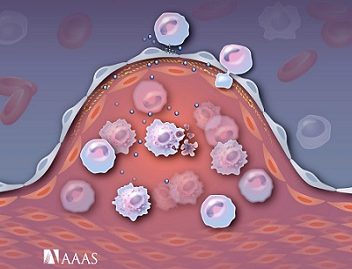Dr. Farokhzad Named One of The Worldview 100 Most Influential People in Biotech by Scientific American
The recent Worldview feature by Scientific American features a list of 100 Biotech leaders and recognizes leading researchers for their fundamental insights into biological processes, as well as those who develop these insights to create biology-based goods and services that are the essence of biotechnology. The honorees also include entrepreneurs and business experts who have been highly influential in enabling biotechnology to flourish, in addition to key media figures who have helped spread this message to the wider community. Dr. Farokhzad was named an honoree on this list for his work on developing and commercializing nanoparticle based drug delivery systems for the treatment of a range of diseases.
[Read more from Scientific American]
Keeping Atherosclerosis in-check with Novel Targeted Inflammation-Resolving Nanomedicines
Nanometer-sized “drones” that deliver a special type of healing molecule to fat deposits in arteries could become a new way to prevent heart attacks caused by atherosclerosis, according to a study in pre-clinical models by the Omid Farokhzad’s lab at Brigham and Women’s Hospital (BWH) and Ira Tabas’s lab at Columbia University Medical Center. These findings were published in the February 18th online issue of Science Translational Medicine. Although current treatments have reduced the number of deaths from atherosclerosis-related disease, atherosclerosis remains a dangerous health problem: Atherosclerosis of the coronary arteries is the #1 killer of women and men in the U.S., resulting in one out of every four deaths. In the study, targeted biodegradable nano ‘drones’ that delivered a special type of drug that promotes healing (‘resolution’) successfully restructured atherosclerotic plaques in mice to make them more stable. This remodeling of the plaque environment would be predicted in humans to block plaque rupture and thrombosis and thereby prevent heart attacks and strokes. “This is the first example of a targeted nanoparticle technology that reduces atherosclerosis in an animal model,” said co-senior author Omid Farokhzad, MD, associate professor and director of the Laboratory of Nanomedicine and Biomaterials at BWH and Harvard Medical School (HMS). “Years of research and collaboration have culminated in our ability to use nanotechnology to resolve inflammation, remodel and stabilize plaques in a model of advanced atherosclerosis.” In this study, targeted nanomedicines made from polymeric building blocks that are utilized in numerous FDA approved products to date, were nanoengineered to carry an inflammation resolving drug payload in the form of a biomimetic peptide called Ac2-26. Furthermore, this peptide was derived from one of the body’s own natural inflammation-resolving proteins called Annexin A1. The way the nanomedicines were designed enabled this biological therapeutic to be released at the target site, the atherosclerotic plaque, in a controlled manner.
[Read more from bizjournals] [Read more from HMS] [Read more from The Telegraph]

